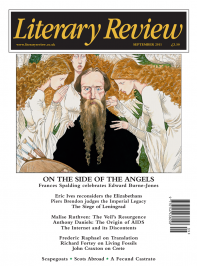Alexander Waugh
Spheres of Influence
A More Perfect Heaven: How Copernicus Revolutionised the Cosmos
By Dava Sobel
Bloomsbury 261pp £14.99
Nicolaus Copernicus (1473–1543) has, by tradition, taken all the credit for establishing the fact of the Earth’s orbit around the sun. Before the publication of his thesis On the Revolutions of the Heavenly Spheres in 1543, and for some time after that, it was generally assumed that the Earth stood still at the centre of a planetary system with the sun, the stars and quite a few of the known planets circling around it. We talk of this change in perception as the ‘Copernican Revolution’ and of the heliocentric principle as ‘Copernicanism’ but, in point of fact, Copernicus was by no means the first to come up with a heliocentric schema. Around 250 BC, according to Archimedes, a philosopher called Aristarchus claimed that ‘the fixed stars and the sun remain unmoved, that the earth revolves about the sun in the circumference of a circle, the sun lying in the middle of the orbit’. Dava Sobel writes that Copernicus ‘had no idea that Aristarchus of Samos had proposed much the same thing in the third century B.C.’ and that he ‘knew nothing of the Earth-moving plan of Aristarchus which had not yet been reported to Latin audiences’.
True, Archimedes’ Arenarius (quoted above) was not published in Latin until 1544, a year after Copernicus’s death, but I don’t see why Copernicus could not have read a library copy in Greek; more to the point, Sobel does reveal that Copernicus had read Plutarch. As far as I

Sign Up to our newsletter
Receive free articles, highlights from the archive, news, details of prizes, and much more.@Lit_Review
Follow Literary Review on Twitter
Twitter Feed
Russia’s recent efforts to destabilise the Baltic states have increased enthusiasm for the EU in these places. With Euroscepticism growing in countries like France and Germany, @owenmatth wonders whether Europe’s salvation will come from its periphery.
Owen Matthews - Sea of Troubles
Owen Matthews: Sea of Troubles - Baltic: The Future of Europe by Oliver Moody
literaryreview.co.uk
Many laptop workers will find Vincenzo Latronico’s PERFECTION sends shivers of uncomfortable recognition down their spine. I wrote about why for @Lit_Review
https://literaryreview.co.uk/hashtag-living
An insightful review by @DanielB89913888 of In Covid’s Wake (Macedo & Lee, @PrincetonUPress).
Paraphrasing: left-leaning authors critique the Covid response using right-wing arguments. A fascinating read.
via @Lit_Review